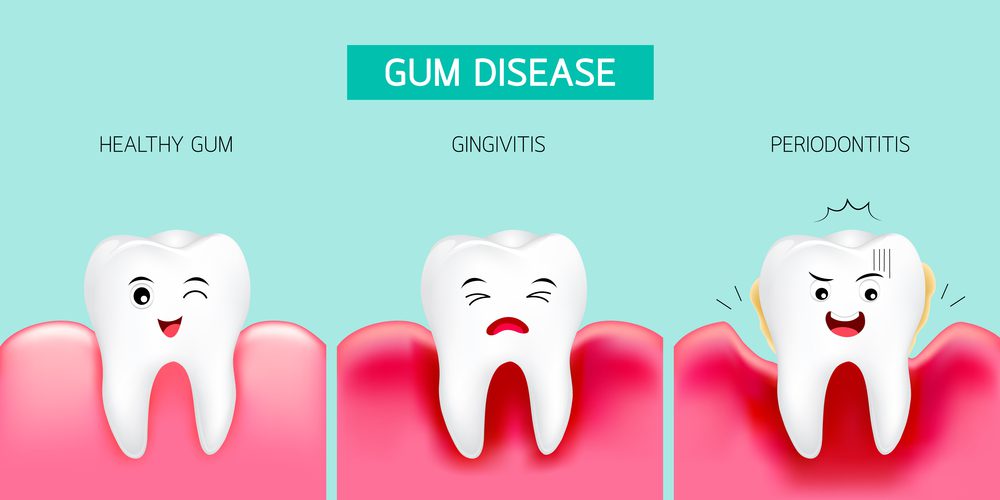Gum disease (also known as periodontal disease or periodontitis) is a progressive inflammatory infection that can be triggered by poor oral health habits, genetics, hormonal changes, and inadequate nutrition. Untreated gum disease can potentially lead to these four detrimental effects:
1. Bad Breath
Bad breath (halitosis) can be an awkward problem for both the sufferer and those around them. While bad breath can be due to subpar oral hygiene, diet, or other factors, halitosis can be also be caused by gum infections. Chronic bad breath may be attributable to an overgrowth of oral pathogens that emit sulfur-producing compounds into the mouth. Periodontal disease-causing bacteria are housed within the plaque and tartar, which accumulate on the gums and teeth.
2. Speech Impairment
Did you know that healthy teeth help us speak clearly? Unfortunately, as periodontitis progresses, it can cause teeth to loosen or fall out. The changed position of the teeth can cause issues when pronouncing words, which affects speaking or singing abilities. For example, if the two front teeth in the upper jaw are lost, the airstream broadens and it can make children sound like they have a lisp.
3. Worsened General Wellness
As previously mentioned, gum disease is an inflammatory disease, which means that the immune system is attacking its tissues and results in the inflammatory response to fight infection. Periodontal disease-causing pathogens start as oral inflammation but can spread throughout the body via the bloodstream. In addition to oral diseases, The American Academy of Periodontology recognizes the connection and progression between gum disease and other diseases, including:
- Diabetes
- Heart disease
- Respiratory disease (such as pneumonia)
- Cancer (including kidney, pancreatic, and blood cancers)
- Alzheimer’s disease
Admittedly, the link between gum disease is not usually a cause-and-effect relationship but rather a mutual one. For instance:
- When you treat gum disease and diabetes (or vice versa), both conditions will improve.
- However, if you ignore treating gum disease and diabetes (or vice versa), both conditions will worsen.
Also, it’s important to mention that oral inflammation may contribute to chronic inflammation all over the body.
4. Decreased Confidence
When young people do not like how their smile looks, it influences how they feel about themselves. According to a study published in The Journal of Clinical and Diagnostic Research, dental disorders cause a profound impact on adolescents’ aesthetics and psychosocial behavior, which affects their self-esteem. Maintaining excellent oral hygiene and eating the right foods can help control visible signs of periodontal disease, including dark spots from untreated dental decay and tooth loss.
Avoid Gum Disease with Periodic Dental Appointments
In summary, untreated periodontal disease can profoundly impact the physical, emotional, and social components of a person’s life. Thankfully, gum disease is largely preventable. Visiting the dental clinic every six months gives dentists a fighting chance of catching and treating the signs of gum disease while it’s still in the reversible stage (gingivitis).
At Smiles Dentistry for Kids, our team of dental professionals helps keep children in Overland Park, KS, and surrounding areas gums healthy by:
- Educating young children about how they can keep their smiles healthy for life
- Providing dental hygiene and other oral health services
- Offering a no-cost dental exam and cleaning for children under two
Prevent the adverse effects of periodontal disease by scheduling your child’s next dental checkup and cleaning by calling (913) 685-9990 or contacting us online today.





